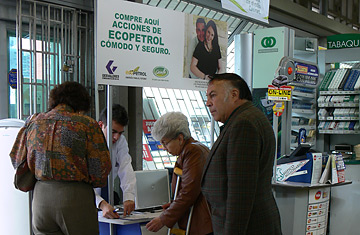
Shoppers at a Carulla supermarket in Bogota stop at a kiosk selling shares in the oil company Ecopetrol.
Adiela Echeverry, a 67-year-old retiree, recently went into her neighborhood Carulla supermarket with a friend to do her weekly grocery shopping. In addition to the usual eggs, fruit and cheese, she also walked out with 1,000 shares of Ecopetrol, Colombia's state oil company. "We came in to do the shopping, and we saw they had the booth for Ecopetrol, so I thought, why not?" she says. The supermarket stock purchase involved a $100 down payment at the checkout counter, with the remaining $600 of the share package price to be paid in 12 interest-free installments.
Supermarkets all over the world seek to expand their turnover by offering everything from cell phones and lottery tickets to utility payment facilities, but Colombia's grocers have begun offering a special unrivaled in the annals of global retail: shares in a multibillion-dollar oil company. The reason? Ecopetrol needs the cash. It made its first ever public offering on Aug 27, putting up for sale about $2.8 billion in shares, or just over 10% of the company's stock. Eventually, it plans to issue a further 10%, hoping the raise the cash necessary to improve its competitiveness in the global energy market.
Until a few years ago, the idea of investing in Ecopetrol might have prompted incredulous chuckles from investors. The company's pipelines were a favorite target of leftist rebel bombs; contractors faced extortion and kidnappings; and exploration crews had to be accompanied by army escort into some of the most violent areas of the country. But things have changed in Colombia. Security is tighter, and pipeline bombings are few and far between. In an increasingly tight global oil market, Colombia is attracting the attention of major oil companies from around the world.
Besides helping Ecopetrol raise investment capital through partial privatization, the government also wants to promote a culture of investment in a country where people are more accustomed to putting their cash under a mattress than in a bank account. That's why Ecopetrol shares are being sold not just through banks and brokerage houses, but also at supermarkets, big-box retail chains and even fitness centers.
Ecopetrol CEO Javier Gutierrez says he'd like to fill Bogota's El Campin soccer stadium for the company's first shareholder meeting. "We want to have 250,000 Colombians as shareholders of Ecopetrol," he said. During the first week of the month-long sale, more than 74,000 Colombians bought shares.
Critics of of the sale fear that the scale of the initial offering of $2.8 billion is beyond what Colombians can absorb, raising the prospect of foreign investors snapping up an interest in Ecopetrol. Jorge Gamboa, president of the USO oil workers' union says Colombia is going against the regional tide of renationalization of oil and energy assets. "Instead, here, we are selling our national patrimony and our natural resources to the highest bidder," he says.
The initial share offering is available only to Colombian citizens and the country's pension and worker funds. Carolina Cuervo, a 33-year-old civil engineer, was a little surprised to see a booth promoting Ecopetrol shares at her gym. But between sets of sit-ups she asked about the investment options. It would be her first share purchase — if she decides to buy. Cuervo is a bit skeptical. "Colombia doesn't have a lot of oil so the risk seems high to me," she says.
Aside from a slight rise last year, oil production in Colombia has been falling steadily and is expected to continue to do so over the next decade unless major oil finds are made. To ward off the specter of becoming a net oil importer, the Colombian government is aggressively promoting exploration in the country.
Ecopetrol executives say declining reserves are precisely why the company needs the cash from the partial privatization. The company has an ambitious five-year $12.5 billion investment plan to expand exploration activities in Colombia and abroad, increase refining capacity, and move into the biofuels market. It currently holds a monopoly on crude transport in Colombia and owns the country's largest refinery in Barrancabermeja. It owns 49% of a second refinery in Cartagena. The company's oil reserves stand at 1.2 billion barrels of oil and average production in 2006 316,000 barrels per day. For Juan Perez, 23, an employee at a social club in Bogota, the numbers show Ecopetrol is a safe investment. As he put it, "You can't go wrong with an oil company, right?"
